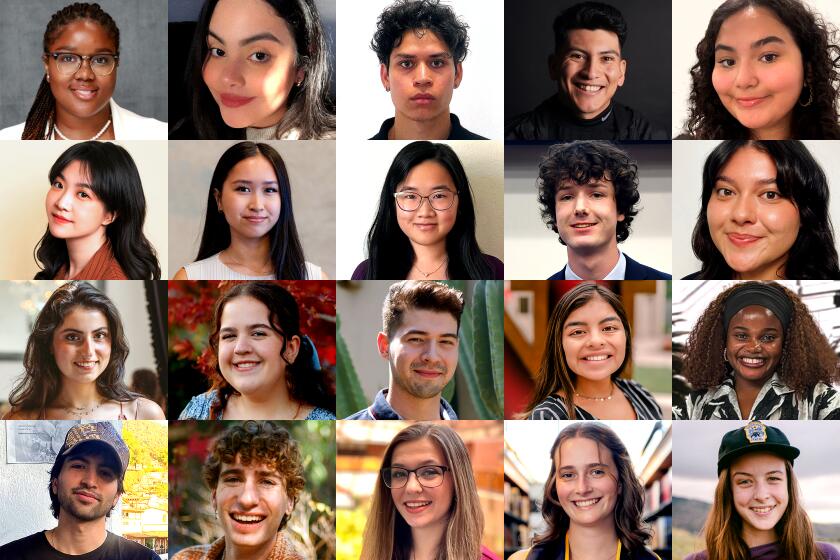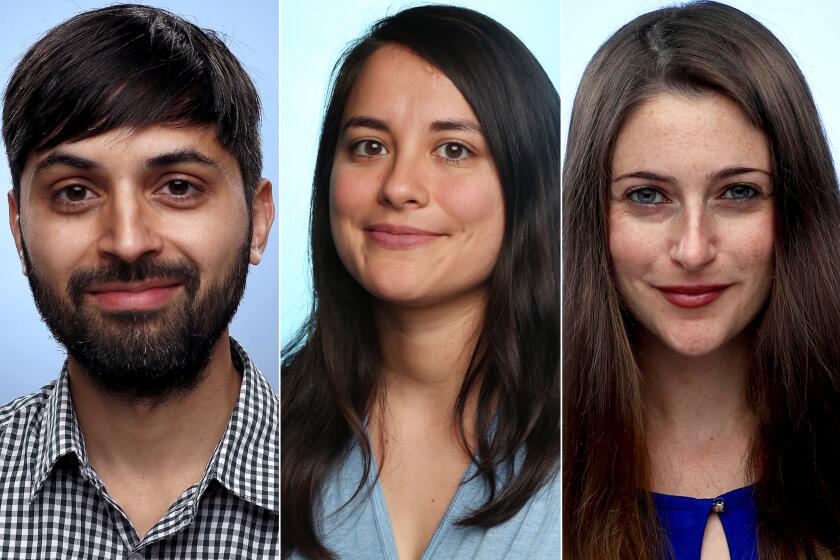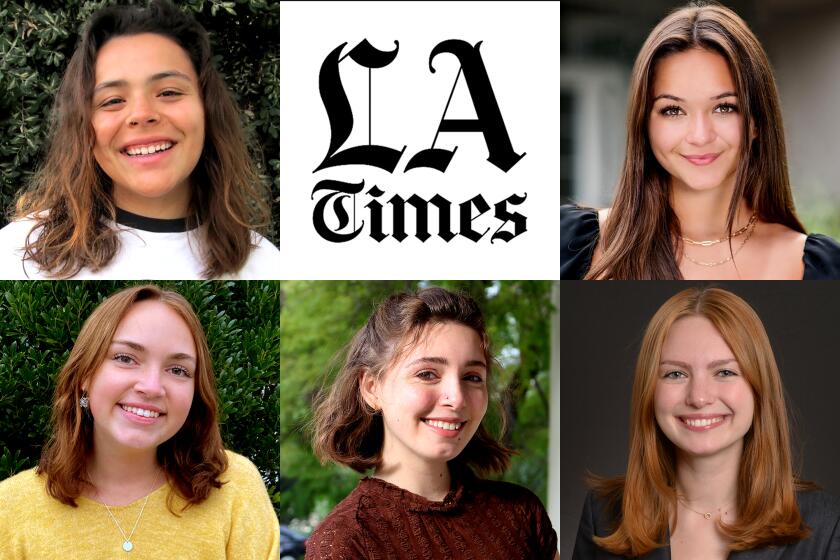Los Angeles Times Announces Newsroom Hirings and Promotions
As part of the rebuilding of the Los Angeles Times, Executive Editor Norman Pearlstine and Managing Editor Scott Kraft made the following announcement.
Over the eight months since The Times was returned to private ownership under Dr. Patrick Soon-Shiong, we’ve been on a mission.
We’ve moved quickly to strengthen our daily newsgathering operation and restore many of the signature pieces of journalism that distinguish The Times from other great publications.
We’ve promoted, recruited and hired as we rebuild and expand areas of coverage that are of value to our community and for which The Times can and should be seen as the authoritative source.
During this process, we’ve had many occasions to celebrate the elevation of dedicated colleagues, the return of respected alumni, and the arrival of sought-after talent.
Today stands out, as we welcome industry-leading editors, a Pulitzer winning writer, and investigative reporters who have won awards for their work nationwide, from Sacramento and Portland to Tampa Bay and Baltimore.
Please join us as we begin by congratulating these valued editors on their new roles.
Jack Leonard, who recently took on new responsibilities as metro’s investigative editor, will take on an expanded role, coordinating metro’s investigative efforts as well as accountability work across the paper. As senior editor/investigations, Jack will continue to work with metro investigative reporters but also will coordinate investigative work in other departments as well as investigative partnerships with other organizations. Jack’s role will be to coordinate the award-winning investigative work that has been a hallmark of our staff for decades, and is done in every department at the paper. He has been both an investigative reporter and editor. He was part of the reporting team that exposed fraud and abuse in California’s conservatorship system and another that revealed how early releases from L.A.’s jail system perverted justice and fostered more crime. As an editor, he has guided, among other major investigations, a sweeping expose of corruption in the L.A. County Sheriff’s Department that helped lead to the conviction of the sheriff.
Mary Ann Meek, a deputy metro editor, will become one of our senior editors responsible for A1 and top stories. As many of you know, Mary Ann has been doing a good part of this job for more than a year, overseeing A1 three days a week, and working with top stories both for online and print. She will continue to have A1 and top story responsibilities, working alongside Ashley Dunn, senior editor/weekends. Her expanded duties will include a larger role in the A1 process, and she will have more time to devote to helping guide our best work online as well as in print. Mary Ann has been an editor at The Times for 25 years, showing a steady hand in some of the biggest stories. On her first day flying solo as an assignment editor in National, federal agents in Texas stormed the Branch Davidian compound. She has been an essential part of helping guide our coverage of four presidential elections, the Oklahoma City bombing, the 9/11 terrorist attacks and Hurricane Katrina. After leaving national to become executive news editor, she was in the A1 chair the night U.S. forces killed Osama bin Laden. She is an L.A. native and graduated with a journalism degree from USC, beginning her career at PBS and the (departed) Herald Examiner.
Steve Marble, an assistant editor on the Foreign/National desk, will take on a new assignment that will be familiar to him — obits editor. Steve will manage, freshen and add to our store of prepared obituaries. He also will work across the paper, assigning editing and occasionally writing obits, and be the assigning editor for obits written off the news. Steve is a native Californian (from Pasadena) who began his career at the Daily Pilot and Long Beach Press Telegram. He joined The Times in 1999 as an assistant city editor and spent time at the Orange County edition as well as the city desk in L.A. He was one of the primary editors on the series of stories about corruption in Bell that won the Pulitzer Prize for public service in 2011. Since 2017, he’s been an assistant editor on the foreign/national desk.
And please join us in welcoming this group of talented journalists to The Times …
Emily Baumgaertner – Health and Science reporter
Emily, who currently works in the New York Times Washington Bureau, is coming onto our health and science team. Her reporting experience includes stories on disease outbreaks, breaking news and health policy. For three years, she was a correspondent and project coordinator for the Pulitzer Center on Crisis Reporting, where she reported for the Atlantic, Foreign Policy, the Washington Post and Scientific American from Sierra Leone and the Democratic Republic of Congo. She has a master’s degree in public health and a bachelor of science in public health from George Washington University and is the author of two publications for scientific journals on cancer genes and traditional medicine in Madagascar.
Anita Chabria – Sacramento reporter
Anita, assistant managing editor at the Sacramento Bee, is joining us as an enterprise reporter in the Sacramento bureau. As a reporter for the Bee, she covered race, immigration, criminal justice and social justice, focusing on accountability journalism as well as breaking news and analaysis. She broke and covered the shooting of a mentally ill black man by police in 2016 – stories that led to a new police chief and major reforms in Sacramento. Her previous work has appeared in the Guardian U.S., USA Today, the L.A. Times and Voice of San Diego, among other publications. She has an undergraduate degree from UC Santa Cruz and a graduate degree in journalism from UC Berkeley.
Paul Feldman – Assistant Editor, Foreign/National
Paul, long a mainstay of our Spring Street newsroom, is returning to The Times as an editor in Foreign/National. His familiar bearded face reappeared in the El Segundo newsroom a few months ago when he returned on a contract to help us out, displaying his wit, incisive editing touch and a very small slice of his famous book collection. We quickly realized how much we had missed him. Paul started at the paper in 1983 as a reporter in the South Bay edition, later moving downtown to cover various beats and amass more than 1,500 bylines, including some on the coverage of the L.A. Riots and the Northridge earthquake, both of which won spot news Pulitzer Prizes. He went on to become an assistant Metro editor, deputy Metro editor and assistant Foreign editor before leaving in late 2015. His career also included stops at the Lawrence (Mass.) Eagle-Tribune, the (Madison) Wisconsin State Journal and the Bergen (N.J.) Record. After leaving The Times, he worked as a staff writer for Fair Warning, a consumer journalism website.
Stuart Leavenworth – Assistant Metro Editor
Stuart joins the metro assignment desk from the McClatchy Washington, D.C., bureau, where he was a national correspondent covering environment, science, energy, climate change and Asian affairs. He was previously Beijing Bureau Chief for McClatchy, and his work has appeared in the New York Times, National Geographic, the Guardian and the Christian Science Monitor. Earlier in his career, he worked at the Sacramento Bee, as a reporter and, for four years, editor of its editorial page. This background makes Stuart an ideal editor to help us chronicle California and keep The Times at the center of the conversation about its future. He has a bachelor’s degree from UC Santa Cruz and a master’s in journalism from Columbia University. His reporting has won several awards, including the National Press Foundation’s Thomas Stokes award for energy writing in 2003.
Richard Martin – Assistant Metro Editor
Richard joins our metro assignment desk from the Baltimore Sun, where he has been senior editor for criminal justice and education since 2014 and guided the paper’s coverage of the death of Freddie Gray and its aftermath. Richard has deep experience guiding accountability journalism, fighting for access to public documents and bringing nuance and context to the many issues facing the criminal justice system today. His previous experience includes stints as an assistant metro editor at the Tampa Bay Times and Seattle Times. Previously, he was city editor at the Californian in Salinas and an editor at Florida Today in Melbourne, Fla., and at the Pacific Daily News in Guam. He has a bachelor’s degree from the University of Guam and is a member of the Asian American Journalists Assn.
Michael Ordoña — The Envelope, reporter
Michael, a longtime Times freelancer, is joining us as a reporter on The Envelope, where he’ll work with Elena Howe on our coverage of film, television and music awards and award contenders. Michael has written for our Calendar and Envelope sections for 12 years, and has extensively covered film, television and music – with special interests in awards season, the Marvel Comics Universe and animation. He has also been a regular contributor to the San Francisco Chronicle, and his movie reviews can be found on Common Sense Media. A versatile writer, Michael’s most notable stories include a joint interview with Daniel Day-Lewis and Paul Thomas Anderson, plus deep dives into the “Hurt Locker” sniper scene and the climactic transformation in “Black Swan.” More recent standout features include Envelope cover stories on Rami Malek and Alfonso Cuarón, and a Chronicle column on whitewashing in the MCU. Michael earned his degree from USC’s Annenberg School of Communication and Journalism but still roots for Bay Area teams even though he’s lived in L.A. twice as long as in Berkeley. He is also the proud father of twin 10-year-olds (a boy and a girl), who, he notes, now write film reviews as well.
Mark Puente – LAPD reporter
Mark joins Metro to cover the Los Angeles Police Department. Mark is a longtime investigative reporter who produced a string of big scoops at the Cleveland Plain Dealer, Baltimore Sun and most recently the Tampa Bay Times. He specializes in law enforcement accountability, and his stories have exposed wrongdoing and corruption. His digging into brutality in the Baltimore Police Department led to widespread outrage, a federal investigation and served as a bellwether for the Freddie Gray scandal that would later grip the nation. In Florida, Mark exposed weak regulators who allowed job placement services to rip off the public. Mark is a shoe-leather reporter known for his relentlessness and drive. He became a journalist after working as a truck driver for 14 years – an experience, he says, that “has helped me connect with sources from all walks of life.” He has a bachelor’s degree in political science from the University of North Carolina at Chapel Hill.
Richard Read – Seattle correspondent
Rich joins us as our Northwest correspondent based in Seattle. Rich spent more than two decades at the Oregonian in Portland, where he won the 1999 Pulitzer Prize for explanatory reporting for a series that illustrated the domestic impact of the Asian economic crisis by profiling the local industry that exports frozen French fries. He was part of a four-person team (including our own Kim Christensen) that won the Pulitzer for public service for a series detailing INS abuses in 2001, and was a 2008 finalist, with a team, for stories on the semiconductor industry expanding in China. Since 2016, he was one of three members of an investigative team at NerdWallet, uncovering student-loan debt-relief scams and exposing conflicts of interest in the USDA’s enforcement and regulation of the organic food industry. While at the Oregonian, he was Asia bureau chief, based in Tokyo, for five years and, upon returning to Portland, covered international business as well as education. He’s a graduate of Amherst College, with a degree in English, and did graduate study in economics and law at Harvard.
Alice Short — Senior Editor/Column One
Alice, one of the paper’s finest editors, is rejoining us as a senior editor. She will work with Steve Padilla on Column One as well as other major enterprise. Throughout her career, as a reporter and editor, Alice has shown an exceptional flair for narrative writing and editing, showcasing her expertise on an extraordinarily broad range of subjects. She spent seven years as assistant managing editor for features, overseeing travel, books, fashion, food, home and health, before her departure in January 2016 to work as a freelance writer. During her time away, she continued to guide special projects for the paper, including the popular and successful Year End section. She also wrote delightful pieces for Travel, including stories from Malta, Sicily, San Antonio, New Orleans and Mexico. Earlier at The Times, she assisted in the birth of the daily feature section that was then called Life & Style and was editor of the Los Angeles Times Magazine for five years. She also has been daily Calendar editor and was an editor in metro working with some of our finest writers. Her stint as the assignment editor for our late food critic Jonathan Gold earned her screen time, as well, in the heralded documentary “City of Gold.” Alice, who is a past president of the Society of Features Journalism, has a bachelor’s degree in history from UCLA. She and her husband, Steve, live in Mar Vista.
These latest additions fill positions that have long been vacant. Our editorial staff, though still significantly smaller than we were three years ago, has grown by more than 25% since Patrick acquired The Times in June. Meanwhile, we continue to develop new areas of coverage for new audiences on new platforms.
We recognize that our legacy print business remains in secular decline, and the recent round of layoffs announced by some of the most prominent digital media companies, suggests that many of the new businesses they – and we – are developing, while promising, aren’t yet profitable.
We shall continue to add to the staff in coming months — even as we review all our operations to see where we can be more efficient – all with an eye toward rebuilding while investing in new opportunities for growth.
We are incredibly optimistic about our future because we see so many opportunities for talented journalists to pursue great ideas and great stories.



